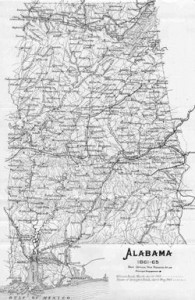 Few Baptist churches of the South discuss soldier deaths in church records. When Southern Baptists do formally recognize the death of one of their own serving in the Confederate Army, such notice is more likely to be in a Baptist associational meeting or published in a Baptist newspaper.
Few Baptist churches of the South discuss soldier deaths in church records. When Southern Baptists do formally recognize the death of one of their own serving in the Confederate Army, such notice is more likely to be in a Baptist associational meeting or published in a Baptist newspaper.
Today, the Alabama Baptist newspaper highlights the life and death of a Baptist soldier from Lowndes County. The narrative, though brief, reinforces the message that home front advocates of mission work in the Confederate Army have been preaching for months: it is imperative that Baptists send chaplains, missionaries and colporteurs to the camps in order to ensure the salvation of their sons, brothers, and husbands.
Many a heart has been made sad, and many of the noble sons of the South have passed from time to eternity since the commencement of the present war; but few purer or better men have died than the subject of this brief notice, Mr. John BARLOW, son of Deacon Thomas Barlow, of Lowndes county, Ala.
He was born December 3rd, 1827, and died at Charlottsville, Virginia, July 17th, 1862. In early youth he embraced religion and became a member of the Baptist Church, and ever adorned the profession he had made – prompt to all the duties of the Church; quiet and unobtrusive in his manners, he was esteemed most by those who knew him best.
In 1859 he moved to Texas, and at the call of his country he entered the army, 1st Texas Regiment, Hoods Brigade, and while performing the duties of a soldier he fell a victim to disease, away from father, brother and sisters, with no Kindred to cheer in his last moments. But those whom he best loved on earth, though they lament his loss, are cheered by the confident belief that the Redeemer was near, to sustain him in his last moments and conduct him safely through the dark vally and shadow of death.
May a kind Providence watch over the entire family thus bereaved that ultimately it may be a family saved in Heaven, no wanderer lost.
Source: “Mr. John Barlow, 1827-1862,” Alabama Baptist, November 20, 1862 (link)


